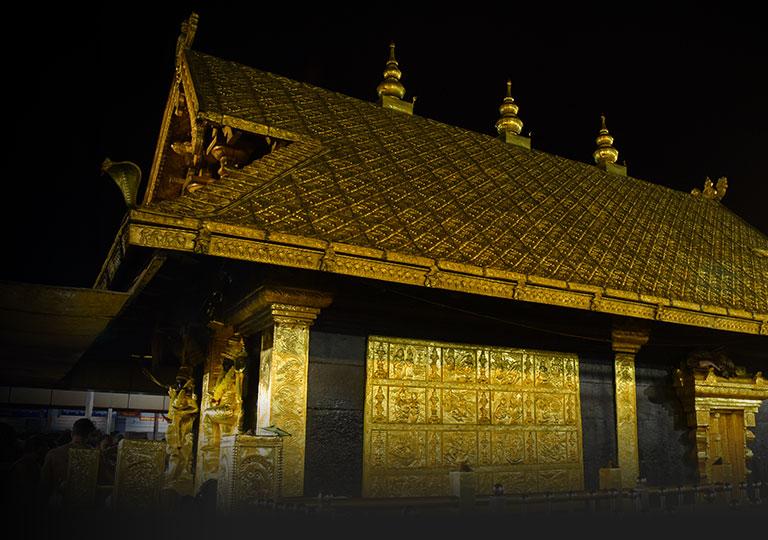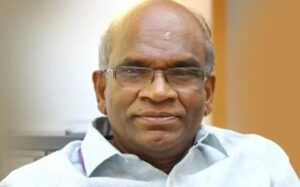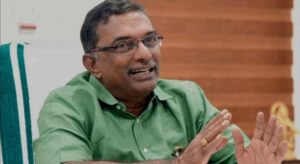For the UDF and the BJP, the scandal offers a rare, potent double-edged weapon: an allegation of corruption combined with a narrative of faith desecration.
Published Nov 14, 2025 | 4:27 PM ⚊ Updated Nov 14, 2025 | 4:27 PM

Gold-plated sanctum sanctorum of Sabarimala.
Synopsis: For the CPI(M), the timing of the alleged gold theft in Sabarimala becoming public is a nightmare. Local body polls are not just political events; they are indicators of cadre discipline, mobilisation strength, and rural support — all of which form the bedrock of LDF’s dominance.
As Kerala moves into the decisive stretch of the two-phase local body elections scheduled for 9 and 11 December, the ruling Left Democratic Front (LDF) finds itself navigating a formidable, politically turbulent waters. This time, however, the storm is not ideological — it is criminal.
The alleged misappropriation of gold from the Sabarimala Sannidhanam and the arrest of former Travancore Devaswom Board (TDB) president and CPI(M) loyalist N Vasu have triggered a credibility crisis that threatens to erode the LDF’s formidable grassroots confidence.
With another former TDB president, senior CPI(M) leader A Padmakumar, under the scanner, the controversy is no longer an administrative embarrassment — it has become a political wound that the opposition is determined to keep open.
For the UDF and the BJP, the scandal offers a rare, potent double-edged weapon: an allegation of corruption combined with a narrative of faith desecration.
For the LDF, it is a test of whether Kerala’s voters will prioritise welfare delivery or punish it for failures — perceived or real — in the sacred space of Sabarimala.
The controversy centres on the alleged loss of gold during the 2019 re-plating of the Dwarapalaka idols and the temple’s door frames.
The issue exploded into the political centre stage after the Kerala High Court-monitored Special Investigation Team (SIT) uncovered discrepancies and moved swiftly to arrest Vasu.
Vasu’s arrest punched holes in the government’s earlier narrative that the issue was the handiwork of low-level officials.
The SIT’s focus on Padmakumar further reinforces that the investigation is inching closer to the political leadership.
For the opposition, the allegations represent more than a financial crime; they signify an erosion of sanctity at one of Hinduism’s holiest shrines.
The dual narrative being pushed is simple and emotionally loaded:
UDF and BJP leaders have repeatedly claimed that the scandal is a “desecration”, an “organised looting”, and “a crime committed under Communist protection”. Whether these charges stick remains the biggest electoral question.
Inside the CPI(M), Vasu’s arrest landed with the force of a meteor.

N Vasu.
A powerful figure within the Devaswom administration, Vasu has held sweeping responsibilities across decades:
Because of this, party insiders admit — albeit privately — that his arrest has “shaken the red fort’s inner foundations”.

CPM leader A Padmakumar
For years, Vasu functioned as the party’s pointsman in the politically sensitive TDB, and that proximity is now being weaponised by the opposition.
The SIT’s tightening grip around former TDB President Padmakumar — another CPI(M) heavyweight and former MLA — has deepened anxiety within the party. Padmakumar’s tenure between 2017 and 2019 coincides with key periods under investigation.
One senior CPI(M) leader conceded, off the record: “We are prepared for political attacks. But the fear is that the next knock may come at far weightier doors.”
The opposition has seized on the scandal as a once-in-a-decade political opportunity.
Leader of Opposition VD Satheesan has gone on the offensive, alleging direct involvement of CPI(M)’s top brass.
He demanded the questioning of former Devaswom Minister Kadakampally Surendran and current Minister VN Vasavan, calling the scandal “a gold robbery executed under political protection”.
KPCC President Sunny Joseph described the scandal as “a stain on rituals”, vowing statewide protests.
Congress ward committees are preparing for symbolic demonstrations on 17 November, with Joseph declaring: “Not just Vasu — many more thieves must reach jail.”
The Congress leadership felt that the issue would resonate in Thiruvananthapuram, Pathanamthitta, Kottayam and parts of Ernakulam.
The BJP’s campaign has been even sharper. State president Rajeev Chandrasekhar has written to Union Home Minister Amit Shah seeking:
The BJP is framing the issue as a long-term institutional collapse caused by “Communist capture of temple administration”. Day-night protests have already been held before the Secretariat.
BJP spokesperson KVS Haridas accused the CPI(M) of “systematically planning the gold robbery” even during the women’s entry issue.
With Hindutva politics having limited but evolving influence in Kerala, the party sees this as a rare opening to consolidate Hindu voters shaken by a perceived violation of sanctity.
For the CPI(M), the timing is a nightmare. Local body polls are not just political events; they are indicators of cadre discipline, mobilisation strength, and rural support — all of which form the bedrock of LDF’s dominance.
Initially dismissive, the LDF realigned its strategy after the High Court’s intervention.
Devaswom Minister Vasavan assured devotees that those responsible “will be put behind bars”.
CPI(M) state secretary MV Govindan insisted: “No matter how influential or powerful the accused is, neither the party nor the government will protect them.”
The LDF is positioning itself as the enabler of the investigation, not its obstacle.
The party is hoping the same formula that worked in 2020 — when the LDF made sweeping gains despite the Sabarimala women’s entry sentiment — will rescue them again.
Party insiders stress that: Local issues, Strong cadre presence, Welfare rollout and Development schemes will outweigh temple-related controversies for most rural voters.
One leader said, “In 2020, despite massive emotional waves (after the 2018 women’s entry), we swept. Local bodies vote on local life.”
Leaders like Saji Cherian argued that many discrepancies originated under Congress-led administrations, shifting blame back across the aisle.
But this “whataboutery” has had limited public impact so far, given the gravity of Vasu’s arrest.
Political analysts are divided on whether the Sabarimala gold misappropriation scandal poses a bigger political threat to the CPI(M) than the women’s entry controversy.
But many agree on one point: this issue carries a deeper and more unpredictable political charge.
Unlike the 2018 women’s entry issue — which largely revolved around faith, doctrine, and constitutional rights — the present scandal merges two combustible sentiments in Kerala’s political landscape.
On the one hand, devotees feel deeply aggrieved, claiming that the sanctity of Sabarimala has been violated.
On the other hand, the allegations hint at corruption and moral decay within a party that has long projected itself as the champion of clean governance.
The convergence of these emotions, analysts warned, could chip away at the LDF’s moderate base in key regions such as Pathanamthitta, Kottayam, and Thiruvananthapuram, where the UDF and BJP already have strong organisational footholds.
Yet not everyone shares this gloomy assessment for the CPI(M).
Veteran journalist and political commentator MP Basheer felt the actual political impact could be limited, especially in the short term.
Referring to the development in which the Enforcement Directorate is planning to register an Enforcement Case Information Report in the gold missing scandal, Basheer stated that Kerala’s electorate has grown increasingly sceptical of central agencies like the Enforcement Directorate, often viewing their interventions through a political lens.
He pointed out that similar agency-driven offensives ahead of the 2021 Assembly elections failed to dent the LDF’s prospects. With many high-profile probes still unresolved, Basheer argues that voters have become desensitised to such announcements.
Moreover, he emphasised that local body elections are largely determined by cadre strength and grassroots mobilisation — an arena where the LDF remains unmatched.
Even so, Basheer conceded that an accumulation of controversies could erode public confidence, at least “to some extent.” Importantly, he frames the current case as a complaint against Vasu personally, not a political indictment of the LDF — a distinction the party is actively trying to reinforce.
The reopening of the gold scandal through the Enforcement Directorate has revived a familiar political battleground in Kerala.
For years, the LDF has accused central agencies of systematically targeting the state government and the CPI(M).
The tensions escalated earlier this year when the ED named the CPI(M) as an accused in the Karuvannur Cooperative Bank case.
With ongoing inquiries into Chief Minister Pinarayi Vijayan’s daughter T Veena, KIIFB’s Masala Bonds, multiple cooperative banks, and the Kerala gold smuggling case, the ruling front has built a narrative that these investigations are less about justice and more about political pressure from the Centre.
This framing may help the LDF blunt some of the fallout — but only if voters perceive the Sabarimala gold case as just another instance of central interference.
If the public instead sees it as a betrayal of sacred trust, the party could find itself navigating one of its most dangerous political storms in recent years.
The central electoral question ahead of the December local body polls is whether the Sabarimala gold scandal will meaningfully damage the LDF’s prospects.
The controversy carries a powerful emotional charge, amplified by the alleged involvement of influential CPI(M) figures and the credibility lent by a High Court-monitored probe.
With the UDF and BJP running aggressive campaigns portraying the episode as “systemic looting,” and with the possibility of further arrests of senior party leaders, the fallout could be particularly severe in politically sensitive zones like rural Pathanamthitta.
Yet, the LDF is not entering the battle without strengths: its formidable organisational machinery, extensive welfare network, and deep cadre presence continue to anchor its support, especially in Gram Panchayats.
Many voters also remain sceptical of central agency interventions, and the Left has a history of weathering emotionally charged controversies, as seen in its sweeping 2020 performance despite the women’s entry backlash.
Political observers say the scandal could erode margins in urban and semi-urban pockets but is unlikely to upend the LDF’s entrenched rural base.
A test of faith, governance, and political resilience
The Sabarimala gold scandal has placed the LDF and CPI(M) in a rare defensive posture.
With doubts cast over prominent leaders and an emotionally charged narrative being weaponised by opponents, the December local body polls will be a referendum not just on governance, but on the sanctity of Kerala’s most revered shrine.
As the SIT continues tightening its probe, the political temperature will only rise.
For the LDF, the coming weeks will test whether its unparalleled organisational strength and welfare performance can outshine a narrative rooted in faith, betrayal, and corruption.
Whether the missing gold will reshape the Kerala political landscape — or remain an electoral tremor — will be revealed in December.
(Edited by Majnu Babu).
